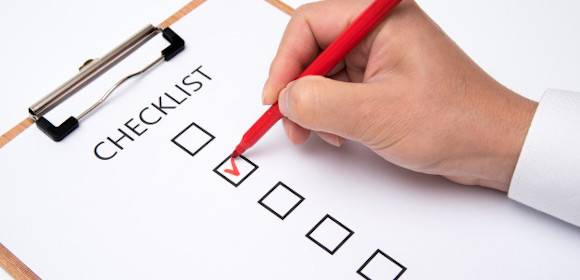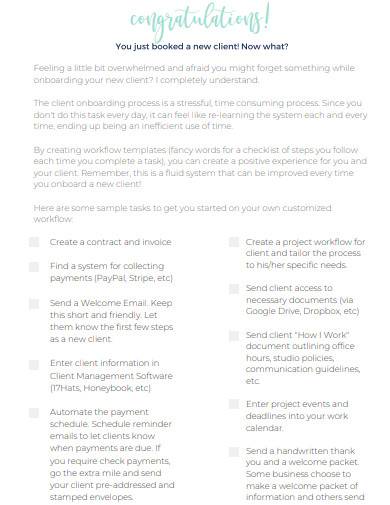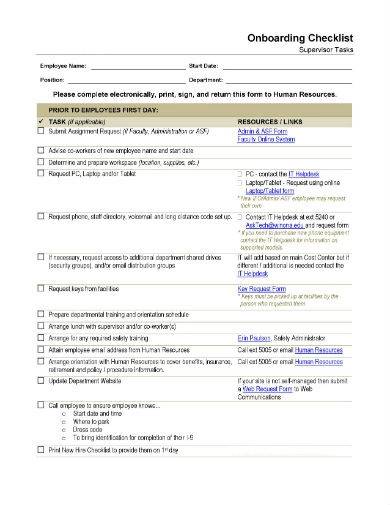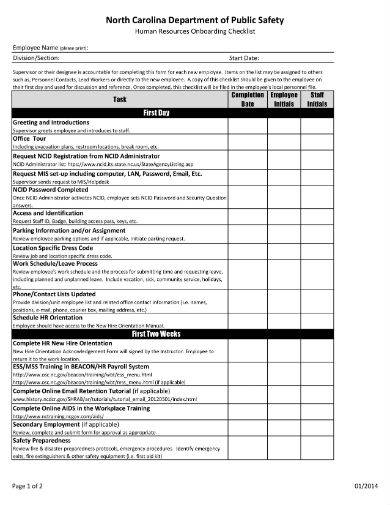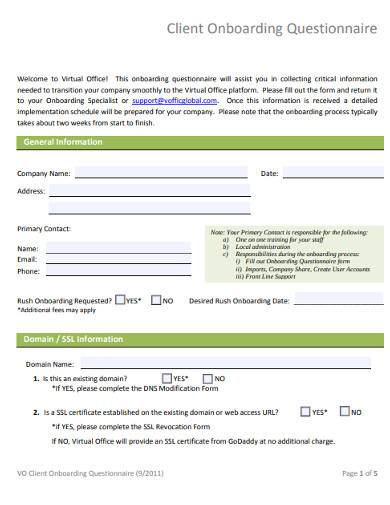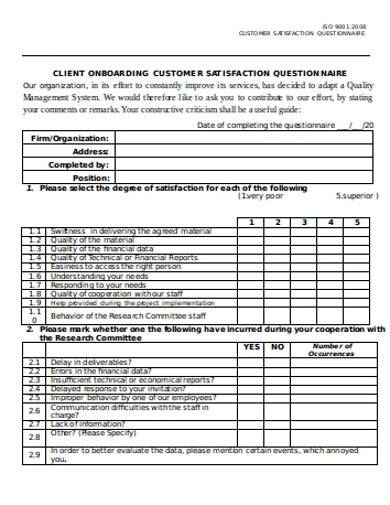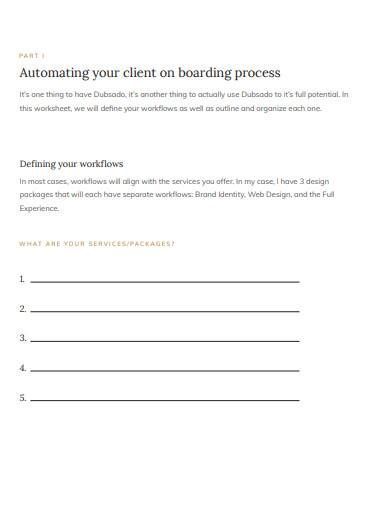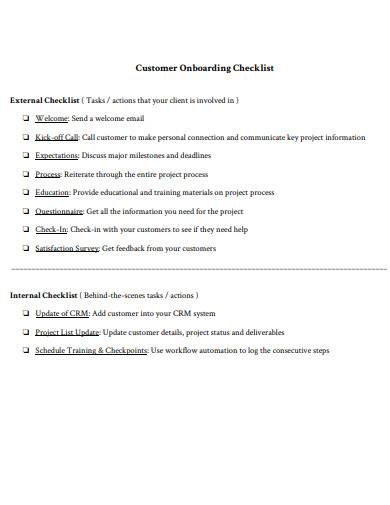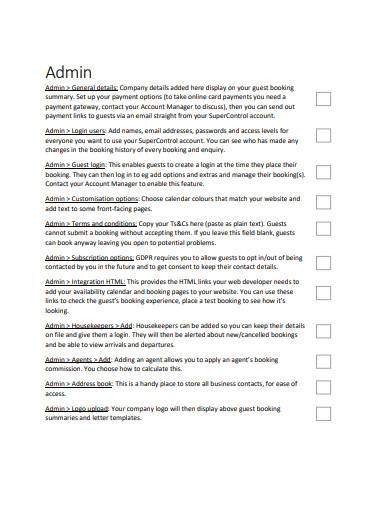So you’re doing business with a new client and they just love your business proposal. It made you think that you’re off to a good start, but are your preparations actually complete? Getting a new client is just the start. The first few days will be critical and if you screw up, you’ll definitely chase your clients away. To complete your preparations you’ll need a client onboarding checklist. A lot of client relations fail because they lack this tool. So if you want to learn more about client onboarding, make sure to check out the information below.
FREE 10+ Client On-boarding Checklist Samples
1. On-boarding Checklist Template
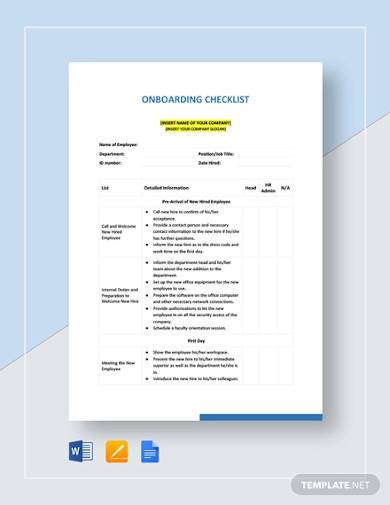
2. Blank Checklist Template
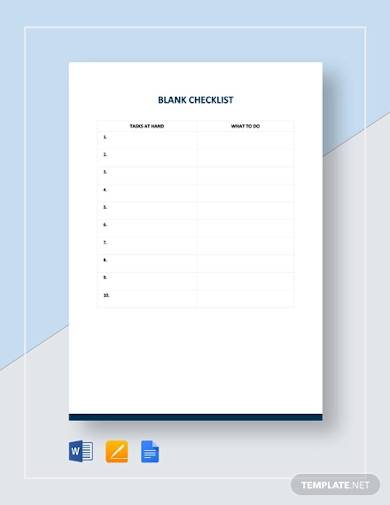
3. Free On-boarding Checklist Sample
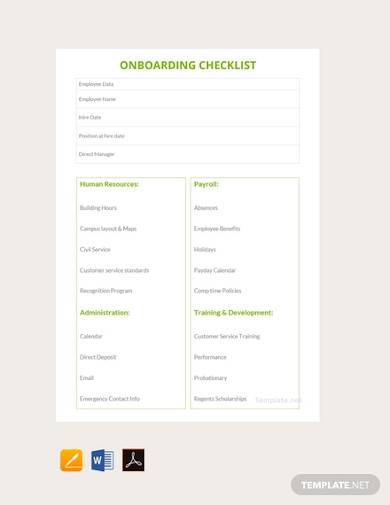
4. Client Onboarding Checklist
5. Sample Onboarding Checklist Form
6. Human Resources Onboarding Checklist
7. Sample Client Onboarding Questionnaire
8. Client Onboarding Customer Satisfaction Questionnaire
9. Client Onboarding Checklist Sample
10. Customer Onboarding Checklist
11. Printable Client Onboarding Checklist
What Is a Client Onboarding Checklist?
A checklist is a reliable listing tool used as reminders for something or for enumerating steps when providing instructions. A client onboarding checklist sample lays out the steps on how to effectively introduce clients to the products and services of a company. A thorough and well-planned onboarding plan not only helps clients become familiar with what the company offers, but it also helps in setting proper expectations.
Why Is Client Onboarding Important?
You should always let your client feel that you value doing business with them. And an excellent way to do that is by having a well-planned client onboarding process. This is an essential first step that you need to take note of. Here are the reasons why.
- Client retention – The first 90 days is critical because it is within these days that clients may decide to leave. Following the steps in a client onboarding checklist will help you build a good relationship with the client. If clients feel valued, they are more likely to stay.
- Ensure compliance – Being compliant with legal obligations is important when doing business. Your client will feel secure if they know that you are compliant with the law. So make sure to include a compliance checklist in your onboarding document.
- Efficient – A repeatable onboarding process allows you to work with any new client efficiently.
- Happy clients – With an onboarding process, you can set good relations with your client and set a clear action plan when doing business. It will definitely make your clients happy.
- Proper expectations – Setting appropriate expectations is always a must. Clients who are aware of what to expect in a business transaction are more understanding. It’s also the perfect way to reduce scope creep.
- More clients – One of the goals of a customer onboarding process is to make them happy. If you’re successful, then you’ll get a lot of sales and referrals.
How To Make a Client Onboarding Checklist
The following steps will serve as your guide to help you come up with a simple yet effective client onboarding checklist.
1. Make a Good Impression
The first thing that you would want to put in your checklist is how you can make an excellent first impression with the client. It doesn’t have to be grand. Simple things like arriving at the meeting place ahead of time and providing a professional business proposal are all you need. Make sure to add that to your checklist template.
2. Ask Questions and Set Expectations
Personally, gather information by asking relevant questions. Asking personal questions is fine as long as you steer away from sensitive and offensive topics. Also, tell the client what they can expect from doing business with you. Make the conversation interesting. A little to-do-list on what you should say or do would be good.
3. Research the Industry and Competition
Gather more information by researching both the client’s industry and their competitors. Doing a simple SWOT analysis will help you organize information. It will then help you create a strategy or an action plan to write on your checklist.
4. Coordinate Internally
Don’t leave your team behind. Include them in your client onboarding plan. Coordinate with them so that they can warmly welcome the client. If done right, this will give you additional good impression points. The client will surely be excited to work with you.
5. Keep Consistent Communication
Onboarding takes time, so you need to maintain constant communication with your client. Do this, and they’ll surely stick with you for a long time. They’ll even refer you to get more business partners.
FAQs
What is the difference between onboarding and orientation?
Many people think that onboarding and orientation mean the same thing. Well, they don’t. Orientation is a gathering intended for new hires to introduce them to the company. It is a one-time event that usually takes place on the first day or within the first week of work. Employee onboarding is a longer process. Through onboarding, employees are informed of their specific roles in a particular department. It is where they learn how to do their jobs and work within a team effectively. Companies must include both orientation and onboarding in their workflow for new employees.
What makes a good client onboarding experience?
Since you’re dealing with business clients, you’ll want to do the transaction professionally. Most of the time, this will lead to either a tense or boring transaction. And you don’t want that during client onboarding. A good client onboarding experience is when you make your clients feel interested and excited about doing business with you. Let them feel valued and, if possible, make the transaction simple and painless. To do this, you’ll need to set proper expectations so that you can discuss matters smoothly.
Who conducts a client onboarding?
In a business or an agency, the marketing department or client relations department are usually tasked with getting new clients. They function effectively using specific client onboarding tools. For example, an accounting firm would need an accounting client onboarding checklist. For a creative business or a similar industry, a creative client onboarding checklist is necessary to ensure that their clients are appropriately introduced to the company.
Your efforts will go to waste if you don’t have a proper onboarding plan for your clients. But if you make the appropriate client onboarding checklist, you’ll reap the fruits of your labor. And the best way to start your customized client onboarding checklist by downloading any of the templates above.
Related Posts
FREE 16+ New Hire Checklist Samples in PDF Google Docs ...
FREE 10+ Purchase Order Invoice Samples & Templates in PSD PDF
FREE 8+ Sample Website Development Agreement Templates in ...
FREE 14+ Sample Event Checklist Templates in Excel MS Word ...
FREE 4+ Contractor Management Checklist Samples in DOC PDF
FREE 9+ Work Order Form Samples in MS Word PDF
FREE 5+ Liability Claim Checklist Samples & Templates in PDF
FREE 7+ Sample Seminar Planning Templates in PDF MS Word
FREE 14+ Sample Wedding Checklists in PDF MS Word | Google ...
Party Planning Sample
FREE 10+ Travel Checklist Samples in Excel Google Docs | MS ...
FREE 6+ Sample Investment Management Agreement Templates in ...
FREE 16+ Meeting Checklist Samples & Templates in PDF MS ...
FREE 19+ Delivery Checklist Samples & Templates in MS Word ...
FREE 14+ Checklist Samples in PDF MS Word | Excel
